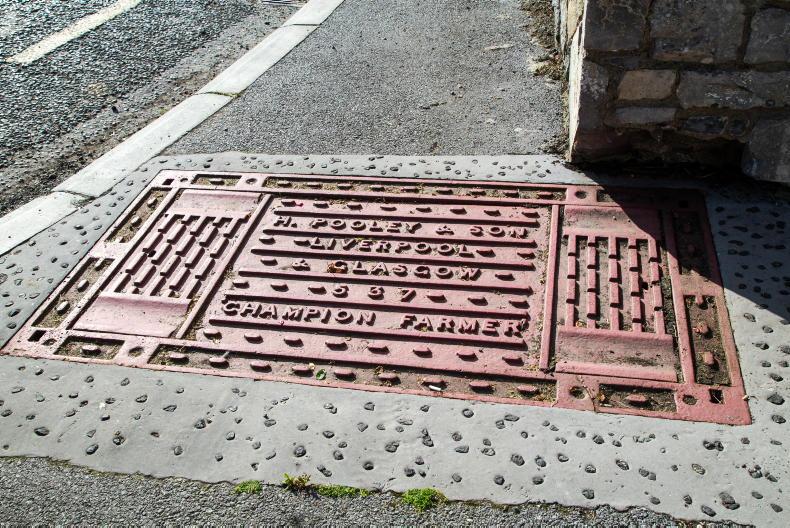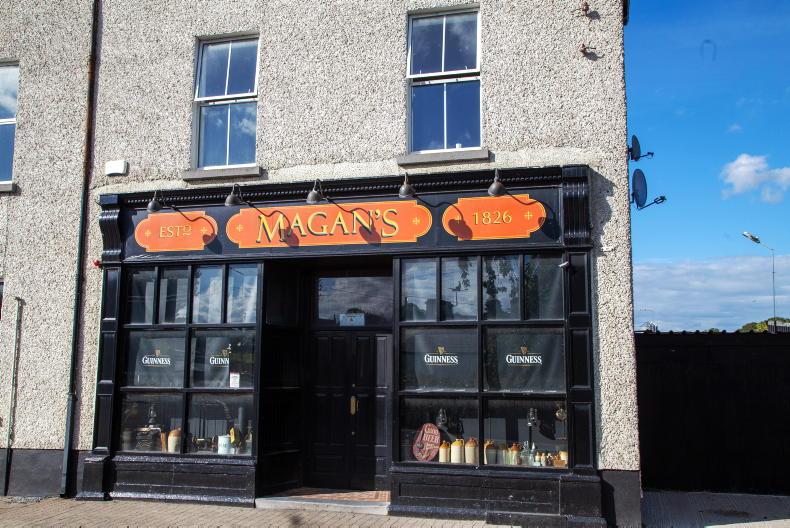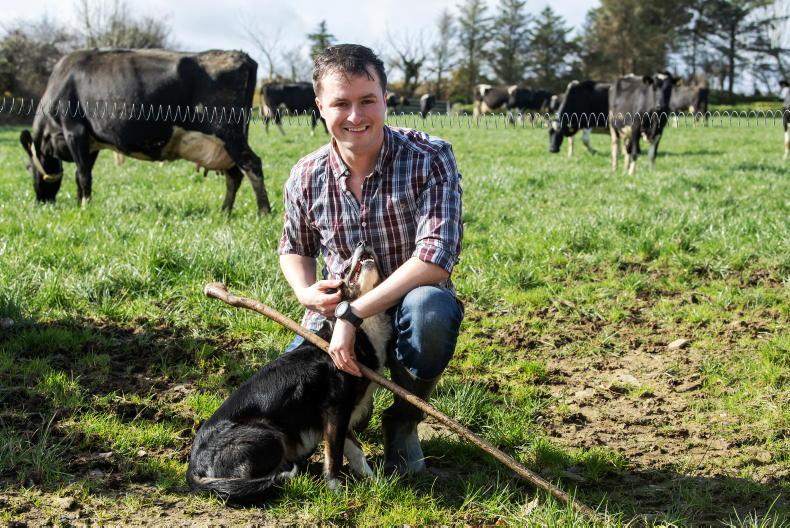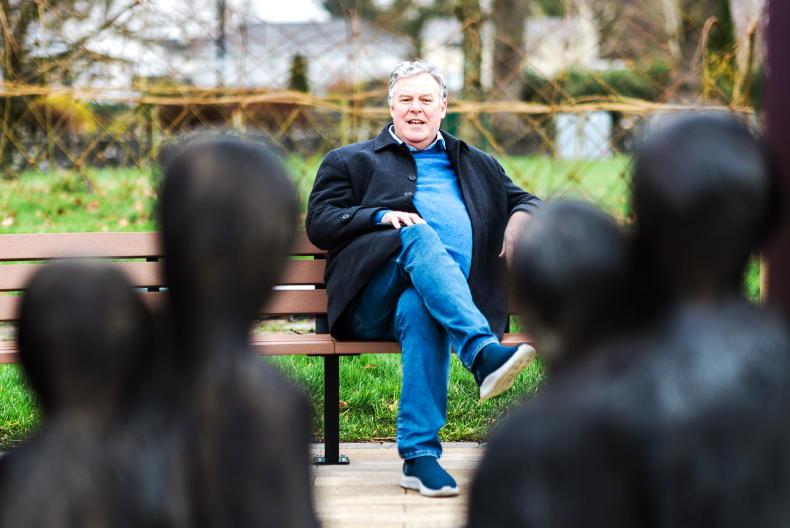This building, the base for today’s piece, is in rude health unlike some of the others featured in these short stories. Back before the focus was solely on being a super pub, this was a grocery, a general merchants, a post office and a bar. Perhaps the name over the door gives it away but of course, I would say it’s super as I’m biased. But what are brothers for without nepotism?
Tales of war
The post office did have an unwanted withdrawal. The Black and Tans robbed the pension money and all the stamps when they were returning from the burning of Granard, on their way back to Roscommon in 1920.
Two of the men that worked here in the 1930s and 1940s; David Jones from Granard and Gregory Burke from Clondra, had their respective political views fashioned by the Civil War.

Back in the 1930s and 1940s, the building was as a post office. Two men working there were David Jones and Gregory Burke, who had opposing political views. \ Claire Nash
One was vehemently pro-Treaty, and the other anti. They conducted their own private civil war by not speaking to each other, only communicating through a third party – “Tell that fella this,” or “Tell that other fella that.” 
They fiercely guarded their respective part of the shop, rarely letting the other one cross an imaginary line on the floor.
To compound things, they stayed on the premises and shared a bedroom. We often wondered; was it like the “tree that falls in the forest”? Were they silent with each other when there were no witnesses?
David worked the grocery section. My dad loved his line in encouraging a purchase: “How about a lock of ‘dem auld sausages ma’am?” Imagine that as an ad on TV today?
Before he went off to garda training in Templemore, another person who worked here was Johnny Duggan. He later went on to become a poet and songwriter of some note with Daniel O’Donnell, Brendan Shine and Foster and Allen all recording his work. He presented a show on MidWwest Radio for years.
But before all that, before he left for garda training college, he had an altercation with John Farrell, the postman. 
Now Longford is full of Farrells, so John had a nickname, but one not used to his face. He was a cranky man. It’s probable that Johnny, as a mischief maker, used this name in front of Farrell the postman and this is how the row erupted. Anyway, whatever it was, they parted on bad terms.
When Johnny was in garda training, he wrote home to his mother every day. For fear that his handwriting would be recognised by Farrell, he would sometimes get others to write the address so as not to arouse suspicion. While not doubting Johnny’s affection for his mother, the added fact that Farrell would have to make the long rough journey on his bike to deliver the letter brought great amusement (and revenge) to Johnny for years. The Duggans lived five miles from the village with the last mile up a bog road that was only passable by foot. Imagine the humour that greeted Mrs Duggan as each of these daily letters were delivered?
Read more
The tale of: ‘Quare talk’ at the pig fair in Longford town
The many tales of: teachers from Killashee old school
The tale of the plumber, the farmer, the fight and the fuel
This building, the base for today’s piece, is in rude health unlike some of the others featured in these short stories. Back before the focus was solely on being a super pub, this was a grocery, a general merchants, a post office and a bar. Perhaps the name over the door gives it away but of course, I would say it’s super as I’m biased. But what are brothers for without nepotism?
Tales of war
The post office did have an unwanted withdrawal. The Black and Tans robbed the pension money and all the stamps when they were returning from the burning of Granard, on their way back to Roscommon in 1920.
Two of the men that worked here in the 1930s and 1940s; David Jones from Granard and Gregory Burke from Clondra, had their respective political views fashioned by the Civil War.

Back in the 1930s and 1940s, the building was as a post office. Two men working there were David Jones and Gregory Burke, who had opposing political views. \ Claire Nash
One was vehemently pro-Treaty, and the other anti. They conducted their own private civil war by not speaking to each other, only communicating through a third party – “Tell that fella this,” or “Tell that other fella that.” 
They fiercely guarded their respective part of the shop, rarely letting the other one cross an imaginary line on the floor.
To compound things, they stayed on the premises and shared a bedroom. We often wondered; was it like the “tree that falls in the forest”? Were they silent with each other when there were no witnesses?
David worked the grocery section. My dad loved his line in encouraging a purchase: “How about a lock of ‘dem auld sausages ma’am?” Imagine that as an ad on TV today?
Before he went off to garda training in Templemore, another person who worked here was Johnny Duggan. He later went on to become a poet and songwriter of some note with Daniel O’Donnell, Brendan Shine and Foster and Allen all recording his work. He presented a show on MidWwest Radio for years.
But before all that, before he left for garda training college, he had an altercation with John Farrell, the postman. 
Now Longford is full of Farrells, so John had a nickname, but one not used to his face. He was a cranky man. It’s probable that Johnny, as a mischief maker, used this name in front of Farrell the postman and this is how the row erupted. Anyway, whatever it was, they parted on bad terms.
When Johnny was in garda training, he wrote home to his mother every day. For fear that his handwriting would be recognised by Farrell, he would sometimes get others to write the address so as not to arouse suspicion. While not doubting Johnny’s affection for his mother, the added fact that Farrell would have to make the long rough journey on his bike to deliver the letter brought great amusement (and revenge) to Johnny for years. The Duggans lived five miles from the village with the last mile up a bog road that was only passable by foot. Imagine the humour that greeted Mrs Duggan as each of these daily letters were delivered?
Read more
The tale of: ‘Quare talk’ at the pig fair in Longford town
The many tales of: teachers from Killashee old school
The tale of the plumber, the farmer, the fight and the fuel












SHARING OPTIONS